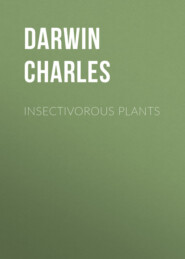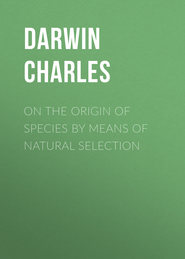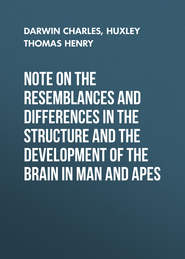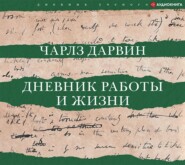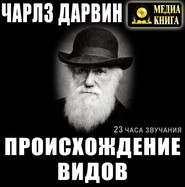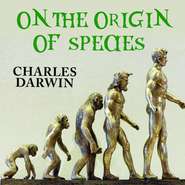По всем вопросам обращайтесь на: info@litportal.ru
(©) 2003-2024.
✖
Charles Darwin: His Life Told in an Autobiographical Chapter, and in a Selected Series of His Published Letters
Настройки чтения
Размер шрифта
Высота строк
Поля
Charles Darwin: His Life Told in an Autobiographical Chapter, and in a Selected Series of His Published Letters
Charles Darwin
Charles Darwin
Charles Darwin: His Life Told in an Autobiographical Chapter, and in a Selected Series of His Published Letters
TO DR. HOLLAND, ST. MORITZ
13th July, 1892.
Dear Holland,
This book is associated in my mind with St. Moritz (where I worked at it), and therefore with you.
I inscribe your name on it, not only in token of my remembrance of your many acts of friendship, but also as a sign of my respect for one who lives a difficult life well.
Yours gratefully,
Francis Darwin.
"For myself I found that I was fitted for nothing so well as for the study of Truth; … as being gifted by nature with desire to seek, patience to doubt, fondness to meditate, slowness to assert, readiness to reconsider, carefulness to dispose and set in order; and as being a man that neither affects what is new nor admires what is old, and that hates every kind of imposture. So I thought my nature had a kind of familiarity and relationship with Truth." – Bacon. (Proem to the Interpretatio Naturæ.)
PREFACE
TO THE FIRST EDITION (1892)
In preparing this volume, which is practically an abbreviation of the Life and Letters (1887), my aim has been to retain as far as possible the personal parts of those volumes. To render this feasible, large numbers of the more purely scientific letters are omitted, or represented by the citation of a few sentences.[1 - I have not thought it necessary to indicate all the omissions in the abbreviated letters.] In certain periods of my father's life the scientific and the personal elements run a parallel course, rising and falling together in their degree of interest. Thus the writing of the Origin of Species, and its publication, appeal equally to the reader who follows my father's career from interest in the man, and to the naturalist who desires to know something of this turning point in the history of Biology. This part of the story has therefore been told with nearly the full amount of available detail.
In arranging my material I have followed a roughly chronological sequence, but the character and variety of my father's researches make a strictly chronological order an impossibility. It was his habit to work more or less simultaneously at several subjects. Experimental work was often carried on as a refreshment or variety, while books entailing reasoning and the marshalling of large bodies of facts were being written. Moreover many of his researches were dropped only to be resumed after years had elapsed. Thus a chronological record of his work would be a patchwork, from which it would be difficult to disentangle the history of any given subject. The Table of Contents will show how I have tried to avoid this result. It will be seen, for instance, that after Chapter VIII. a break occurs; the story turns back from 1854 to 1831 in order that the Evolutionary chapters which follow may tell a continuous story. In the same way the Botanical Work which occupied so much of my father's time during the latter part of his life is treated separately in Chapters XVI. and XVII.
With regard to Chapter IV., in which I have attempted to give an account of my father's manner of working, I may be allowed to say that I acted as his assistant during the last eight years of his life, and had therefore an opportunity of knowing something of his habits and methods.
My acknowledgments are gladly made to the publishers of the Century Magazine, who have courteously given me the use of one of their illustrations for the heading of Chapter IV.
FRANCIS DARWIN.
Wychfield, Cambridge,
August, 1892.
NOTE TO THE SECOND EDITION
It is pleasure to me to acknowledge the kindness of Messrs. Elliott & Fry in allowing me to reproduce the fine photograph which appears as the frontispiece to the present issue.
FRANCIS DARWIN.
Wychfield, Cambridge,
April, 1902.
CHAPTER I.
THE DARWINS
Charles Robert Darwin was the second son of Dr. Robert Waring Darwin, of Shrewsbury, where he was born on February 12, 1809. Dr. Darwin was a son of Erasmus Darwin, sometimes described as a poet, but more deservedly known as physician and naturalist. Charles Darwin's mother was Susannah, daughter of Josiah Wedgwood, the well-known potter of Etruria, in Staffordshire.
If such speculations are permissible, we may hazard the guess that Charles Darwin inherited his sweetness of disposition from the Wedgwood side, while the character of his genius came rather from the Darwin grandfather.[2 - See Charles Darwin's biographical sketch of his grandfather, prefixed to Ernst Krause's Erasmus Darwin. (Translated from the German by W. S. Dallas, 1878.) Also Miss Meteyard's Life of Josiah Wedgwood.]
Robert Waring Darwin was a man of well-marked character. He had no pretensions to being a man of science, no tendency to generalise his knowledge, and though a successful physician he was guided more by intuition and everyday observation than by a deep knowledge of his subject. His chief mental characteristics were his keen powers of observation, and his knowledge of men, qualities which led him to "read the characters and even the thoughts of those whom he saw even for a short time." It is not therefore surprising that his help should have been sought, not merely in illness, but in cases of family trouble and sorrow. This was largely the case, and his wise sympathy, no less than his medical skill, obtained for him a strong influence over the lives of a large number of people. He was a man of a quick, vivid temperament, with a lively interest in even the smaller details in the lives of those with whom he came in contact. He was fond of society, and entertained a good deal, and with his large practice and many friends, the life at Shrewsbury must have been a stirring and varied one – very different in this respect to the later home of his son at Down.[3 - The above passage is, by permission of Messrs. Smith & Elder, taken from my article Charles Darwin, in the Dictionary of National Biography.]
We have a miniature of his wife, Susannah, with a remarkably sweet and happy face, bearing some resemblance to the portrait of her father painted by Sir Joshua Reynolds; a countenance expressive of the gentle and sympathetic nature which Miss Meteyard ascribes to her.[4 - A Group of Englishmen, by Miss Meteyard, 1871.] She died July 15, 1817, thirty-two years before her husband, whose death occurred on November 13, 1848. Dr. Darwin lived before his marriage for two or three years on St. John's Hill, afterwards at the Crescent, where his eldest daughter Marianne was born, lastly at the "Mount," in the part of Shrewsbury known as Frankwell, where the other children were born. This house was built by Dr. Darwin about 1800, it is now in the possession of Mr. Spencer Phillips, and has undergone but little alteration. It is a large, plain, square, red-brick house, of which the most attractive feature is the pretty green-house, opening out of the morning-room.
The house is charmingly placed, on the top of a steep bank leading down to the Severn. The terraced bank is traversed by a long walk, leading from end to end, still called "the Doctor's Walk." At one point in this walk grows a Spanish chestnut, the branches of which bend back parallel to themselves in a curious manner, and this was Charles Darwin's favourite tree as a boy, where he and his sister Catharine had each their special seat.
The Doctor took great pleasure in his garden, planting it with ornamental trees and shrubs, and being especially successful with fruit trees; and this love of plants was, I think, the only taste kindred to natural history which he possessed.
Charles Darwin had the strongest feeling of love and respect for his father's memory. His recollection of everything that was connected with him was peculiarly distinct, and he spoke of him frequently, generally prefacing an anecdote with some such phrase as, "My father, who was the wisest man I ever knew," &c. It was astonishing how clearly he remembered his father's opinions, so that he was able to quote some maxim or hint of his in many cases of illness. As a rule he put small faith in doctors, and thus his unlimited belief in Dr. Darwin's medical instinct and methods of treatment was all the more striking.
His reverence for him was boundless, and most touching. He would have wished to judge everything else in the world dispassionately, but anything his father had said was received with almost implicit faith. His daughter, Mrs. Litchfield, remembers him saying that he hoped none of his sons would ever believe anything because he said it, unless they were themselves convinced of its truth – a feeling in striking contrast with his own manner of faith.
A visit which Charles Darwin made to Shrewsbury in 1869 left on the mind of the daughter who accompanied him a strong impression of his love for his old home. The tenant of the Mount at the time, showed them over the house, and with mistaken hospitality remained with the party during the whole visit. As they were leaving, Charles Darwin said, with a pathetic look of regret, "If I could have been left alone in that green-house for five minutes, I know I should have been able to see my father in his wheel-chair as vividly as if he had been there before me."
Perhaps this incident shows what I think is the truth, that the memory of his father he loved the best, was that of him as an old man. Mrs. Litchfield has noted down a few words which illustrate well his feeling towards his father. She describes him as saying with the most tender respect, "I think my father was a little unjust to me when I was young; but afterwards, I am thankful to think I became a prime favourite with him." She has a vivid recollection of the expression of happy reverie that accompanied these words, as if he were reviewing the whole relation, and the remembrance left a deep sense of peace and gratitude.
Dr. Darwin had six children, of whom none are now living: Marianne, married Dr. Henry Parker; Caroline, married Josiah Wedgwood; Erasmus Alvey; Susan, died unmarried; Charles Robert; Catharine, married Rev. Charles Langton.
The elder son, Erasmus, was born in 1804, and died unmarried at the age of seventy-seven.
His name, not known to the general public, may be remembered from a few words of description occurring in Carlyle's Reminiscences (vol. ii. p. 208). A truer and more sympathetic sketch of his character, by his cousin, Miss Julia Wedgwood, was published in the Spectator, September 3, 1881.
There was something pathetic in Charles Darwin's affection for his brother Erasmus, as if he always recollected his solitary life, and the touching patience and sweetness of his nature. He often spoke of him as "Poor old Ras," or "Poor dear old Philos." I imagine Philos (Philosopher) was a relic of the days when they worked at chemistry in the tool-house at Shrewsbury – a time of which he always preserved a pleasant memory. Erasmus was rather more than four years older than Charles Darwin, so that they were not long together at Cambridge, but previously at Edinburgh they shared the same lodgings, and after the Voyage they lived for a time together in Erasmus' house in Great Marlborough Street. In later years Erasmus Darwin came to Down occasionally, or joined his brother's family in a summer holiday. But gradually it came about that he could not, through ill health, make up his mind to leave London, and thus they only saw each other when Charles Darwin went for a week at a time to his brother's house in Queen Anne Street.
This brief sketch of the family to which Charles Darwin belonged may perhaps suffice to introduce the reader to the autobiographical chapter which follows.
CHAPTER II.
AUTOBIOGRAPHY
[My father's autobiographical recollections, given in the present chapter, were written for his children, – and written without any thought that they would ever be published. To many this may seem an impossibility; but those who knew my father will understand how it was not only possible, but natural. The autobiography bears the heading, Recollections of the Development of my Mind and Character, and ends with the following note: – "Aug. 3, 1876. This sketch of my life was begun about May 28th at Hopedene,[5 - The late Mr. Hensleigh Wedgwood's house in Surrey.] and since then I have written for nearly an hour on most afternoons." It will easily be understood that, in a narrative of a personal and intimate kind written for his wife and children, passages should occur which must here be omitted; and I have not thought it necessary to indicate where such omissions are made. It has been found necessary to make a few corrections of obvious verbal slips, but the number of such alterations has been kept down to the minimum. – F. D]
A German Editor having written to me for an account of the development of my mind and character with some sketch of my autobiography, I have thought that the attempt would amuse me, and might possibly interest my children or their children. I know that it would have interested me greatly to have read even so short and dull a sketch of the mind of my grandfather, written by himself, and what he thought and did, and how he worked. I have attempted to write the following account of myself, as if I were a dead man in another world looking back at my own life. Nor have I found this difficult, for life is nearly over with me. I have taken no pains about my style of writing.
I was born at Shrewsbury on February 12th, 1809, and my earliest recollection goes back only to when I was a few months over four years old, when we went to near Abergele for sea-bathing, and I recollect some events and places there with some little distinctness.
My mother died in July 1817, when I was a little over eight years old, and it is odd that I can remember hardly anything about her except her deathbed, her black velvet gown, and her curiously constructed work-table. In the spring of this same year I was sent to a day-school in Shrewsbury, where I stayed a year. I have been told that I was much slower in learning than my younger sister Catherine, and I believe that I was in many ways a naughty boy.
By the time I went to this day-school[6 - Kept by Rev. G. Case, minister of the Unitarian Chapel in the High Street. Mrs. Darwin was a Unitarian and attended Mr. Case's chapel, and my father as a little boy went there with his elder sisters. But both he and his brother were christened and intended to belong to the Church of England; and after his early boyhood he seems usually to have gone to church and not to Mr. Case's. It appears (St. James's Gazette, December 15, 1883) that a mural tablet has been erected to his memory in the chapel, which is now known as the "Free Christian Church." – F. D.] my taste for natural history, and more especially for collecting, was well developed. I tried to make out the names of plants, and collected all sorts of things, shells, seals, franks, coins, and minerals. The passion for collecting which leads a man to be a systematic naturalist, a virtuoso, or a miser, was very strong in me, and was clearly innate, as none of my sisters or brother ever had this taste.
One little event during this year has fixed itself very firmly in my mind, and I hope that it has done so from my conscience having been afterwards sorely troubled by it; it is curious as showing that apparently I was interested at this early age in the variability of plants! I told another little boy (I believe it was Leighton,[7 - Rev. W. A. Leighton remembers his bringing a flower to school and saying that his mother had taught him how by looking at the inside of the blossom the name of the plant could be discovered. Mr. Leighton goes on, "This greatly roused my attention and curiosity, and I inquired of him repeatedly how this could be done?" – but his lesson was naturally enough not transmissible. – F. D.] who afterwards became a well-known lichenologist and botanist), that I could produce variously coloured polyanthuses and primroses by watering them with certain coloured fluids, which was of course a monstrous fable, and had never been tried by me. I may here also confess that as a little boy I was much given to inventing deliberate falsehoods, and this was always done for the sake of causing excitement. For instance, I once gathered much valuable fruit from my father's trees and hid it in the shrubbery, and then ran in breathless haste to spread the news that I had discovered a hoard of stolen fruit.[8 - His father wisely treated this tendency not by making crimes of the fibs, but by making light of the discoveries. – F. D.]
Charles Darwin
Charles Darwin
Charles Darwin: His Life Told in an Autobiographical Chapter, and in a Selected Series of His Published Letters
TO DR. HOLLAND, ST. MORITZ
13th July, 1892.
Dear Holland,
This book is associated in my mind with St. Moritz (where I worked at it), and therefore with you.
I inscribe your name on it, not only in token of my remembrance of your many acts of friendship, but also as a sign of my respect for one who lives a difficult life well.
Yours gratefully,
Francis Darwin.
"For myself I found that I was fitted for nothing so well as for the study of Truth; … as being gifted by nature with desire to seek, patience to doubt, fondness to meditate, slowness to assert, readiness to reconsider, carefulness to dispose and set in order; and as being a man that neither affects what is new nor admires what is old, and that hates every kind of imposture. So I thought my nature had a kind of familiarity and relationship with Truth." – Bacon. (Proem to the Interpretatio Naturæ.)
PREFACE
TO THE FIRST EDITION (1892)
In preparing this volume, which is practically an abbreviation of the Life and Letters (1887), my aim has been to retain as far as possible the personal parts of those volumes. To render this feasible, large numbers of the more purely scientific letters are omitted, or represented by the citation of a few sentences.[1 - I have not thought it necessary to indicate all the omissions in the abbreviated letters.] In certain periods of my father's life the scientific and the personal elements run a parallel course, rising and falling together in their degree of interest. Thus the writing of the Origin of Species, and its publication, appeal equally to the reader who follows my father's career from interest in the man, and to the naturalist who desires to know something of this turning point in the history of Biology. This part of the story has therefore been told with nearly the full amount of available detail.
In arranging my material I have followed a roughly chronological sequence, but the character and variety of my father's researches make a strictly chronological order an impossibility. It was his habit to work more or less simultaneously at several subjects. Experimental work was often carried on as a refreshment or variety, while books entailing reasoning and the marshalling of large bodies of facts were being written. Moreover many of his researches were dropped only to be resumed after years had elapsed. Thus a chronological record of his work would be a patchwork, from which it would be difficult to disentangle the history of any given subject. The Table of Contents will show how I have tried to avoid this result. It will be seen, for instance, that after Chapter VIII. a break occurs; the story turns back from 1854 to 1831 in order that the Evolutionary chapters which follow may tell a continuous story. In the same way the Botanical Work which occupied so much of my father's time during the latter part of his life is treated separately in Chapters XVI. and XVII.
With regard to Chapter IV., in which I have attempted to give an account of my father's manner of working, I may be allowed to say that I acted as his assistant during the last eight years of his life, and had therefore an opportunity of knowing something of his habits and methods.
My acknowledgments are gladly made to the publishers of the Century Magazine, who have courteously given me the use of one of their illustrations for the heading of Chapter IV.
FRANCIS DARWIN.
Wychfield, Cambridge,
August, 1892.
NOTE TO THE SECOND EDITION
It is pleasure to me to acknowledge the kindness of Messrs. Elliott & Fry in allowing me to reproduce the fine photograph which appears as the frontispiece to the present issue.
FRANCIS DARWIN.
Wychfield, Cambridge,
April, 1902.
CHAPTER I.
THE DARWINS
Charles Robert Darwin was the second son of Dr. Robert Waring Darwin, of Shrewsbury, where he was born on February 12, 1809. Dr. Darwin was a son of Erasmus Darwin, sometimes described as a poet, but more deservedly known as physician and naturalist. Charles Darwin's mother was Susannah, daughter of Josiah Wedgwood, the well-known potter of Etruria, in Staffordshire.
If such speculations are permissible, we may hazard the guess that Charles Darwin inherited his sweetness of disposition from the Wedgwood side, while the character of his genius came rather from the Darwin grandfather.[2 - See Charles Darwin's biographical sketch of his grandfather, prefixed to Ernst Krause's Erasmus Darwin. (Translated from the German by W. S. Dallas, 1878.) Also Miss Meteyard's Life of Josiah Wedgwood.]
Robert Waring Darwin was a man of well-marked character. He had no pretensions to being a man of science, no tendency to generalise his knowledge, and though a successful physician he was guided more by intuition and everyday observation than by a deep knowledge of his subject. His chief mental characteristics were his keen powers of observation, and his knowledge of men, qualities which led him to "read the characters and even the thoughts of those whom he saw even for a short time." It is not therefore surprising that his help should have been sought, not merely in illness, but in cases of family trouble and sorrow. This was largely the case, and his wise sympathy, no less than his medical skill, obtained for him a strong influence over the lives of a large number of people. He was a man of a quick, vivid temperament, with a lively interest in even the smaller details in the lives of those with whom he came in contact. He was fond of society, and entertained a good deal, and with his large practice and many friends, the life at Shrewsbury must have been a stirring and varied one – very different in this respect to the later home of his son at Down.[3 - The above passage is, by permission of Messrs. Smith & Elder, taken from my article Charles Darwin, in the Dictionary of National Biography.]
We have a miniature of his wife, Susannah, with a remarkably sweet and happy face, bearing some resemblance to the portrait of her father painted by Sir Joshua Reynolds; a countenance expressive of the gentle and sympathetic nature which Miss Meteyard ascribes to her.[4 - A Group of Englishmen, by Miss Meteyard, 1871.] She died July 15, 1817, thirty-two years before her husband, whose death occurred on November 13, 1848. Dr. Darwin lived before his marriage for two or three years on St. John's Hill, afterwards at the Crescent, where his eldest daughter Marianne was born, lastly at the "Mount," in the part of Shrewsbury known as Frankwell, where the other children were born. This house was built by Dr. Darwin about 1800, it is now in the possession of Mr. Spencer Phillips, and has undergone but little alteration. It is a large, plain, square, red-brick house, of which the most attractive feature is the pretty green-house, opening out of the morning-room.
The house is charmingly placed, on the top of a steep bank leading down to the Severn. The terraced bank is traversed by a long walk, leading from end to end, still called "the Doctor's Walk." At one point in this walk grows a Spanish chestnut, the branches of which bend back parallel to themselves in a curious manner, and this was Charles Darwin's favourite tree as a boy, where he and his sister Catharine had each their special seat.
The Doctor took great pleasure in his garden, planting it with ornamental trees and shrubs, and being especially successful with fruit trees; and this love of plants was, I think, the only taste kindred to natural history which he possessed.
Charles Darwin had the strongest feeling of love and respect for his father's memory. His recollection of everything that was connected with him was peculiarly distinct, and he spoke of him frequently, generally prefacing an anecdote with some such phrase as, "My father, who was the wisest man I ever knew," &c. It was astonishing how clearly he remembered his father's opinions, so that he was able to quote some maxim or hint of his in many cases of illness. As a rule he put small faith in doctors, and thus his unlimited belief in Dr. Darwin's medical instinct and methods of treatment was all the more striking.
His reverence for him was boundless, and most touching. He would have wished to judge everything else in the world dispassionately, but anything his father had said was received with almost implicit faith. His daughter, Mrs. Litchfield, remembers him saying that he hoped none of his sons would ever believe anything because he said it, unless they were themselves convinced of its truth – a feeling in striking contrast with his own manner of faith.
A visit which Charles Darwin made to Shrewsbury in 1869 left on the mind of the daughter who accompanied him a strong impression of his love for his old home. The tenant of the Mount at the time, showed them over the house, and with mistaken hospitality remained with the party during the whole visit. As they were leaving, Charles Darwin said, with a pathetic look of regret, "If I could have been left alone in that green-house for five minutes, I know I should have been able to see my father in his wheel-chair as vividly as if he had been there before me."
Perhaps this incident shows what I think is the truth, that the memory of his father he loved the best, was that of him as an old man. Mrs. Litchfield has noted down a few words which illustrate well his feeling towards his father. She describes him as saying with the most tender respect, "I think my father was a little unjust to me when I was young; but afterwards, I am thankful to think I became a prime favourite with him." She has a vivid recollection of the expression of happy reverie that accompanied these words, as if he were reviewing the whole relation, and the remembrance left a deep sense of peace and gratitude.
Dr. Darwin had six children, of whom none are now living: Marianne, married Dr. Henry Parker; Caroline, married Josiah Wedgwood; Erasmus Alvey; Susan, died unmarried; Charles Robert; Catharine, married Rev. Charles Langton.
The elder son, Erasmus, was born in 1804, and died unmarried at the age of seventy-seven.
His name, not known to the general public, may be remembered from a few words of description occurring in Carlyle's Reminiscences (vol. ii. p. 208). A truer and more sympathetic sketch of his character, by his cousin, Miss Julia Wedgwood, was published in the Spectator, September 3, 1881.
There was something pathetic in Charles Darwin's affection for his brother Erasmus, as if he always recollected his solitary life, and the touching patience and sweetness of his nature. He often spoke of him as "Poor old Ras," or "Poor dear old Philos." I imagine Philos (Philosopher) was a relic of the days when they worked at chemistry in the tool-house at Shrewsbury – a time of which he always preserved a pleasant memory. Erasmus was rather more than four years older than Charles Darwin, so that they were not long together at Cambridge, but previously at Edinburgh they shared the same lodgings, and after the Voyage they lived for a time together in Erasmus' house in Great Marlborough Street. In later years Erasmus Darwin came to Down occasionally, or joined his brother's family in a summer holiday. But gradually it came about that he could not, through ill health, make up his mind to leave London, and thus they only saw each other when Charles Darwin went for a week at a time to his brother's house in Queen Anne Street.
This brief sketch of the family to which Charles Darwin belonged may perhaps suffice to introduce the reader to the autobiographical chapter which follows.
CHAPTER II.
AUTOBIOGRAPHY
[My father's autobiographical recollections, given in the present chapter, were written for his children, – and written without any thought that they would ever be published. To many this may seem an impossibility; but those who knew my father will understand how it was not only possible, but natural. The autobiography bears the heading, Recollections of the Development of my Mind and Character, and ends with the following note: – "Aug. 3, 1876. This sketch of my life was begun about May 28th at Hopedene,[5 - The late Mr. Hensleigh Wedgwood's house in Surrey.] and since then I have written for nearly an hour on most afternoons." It will easily be understood that, in a narrative of a personal and intimate kind written for his wife and children, passages should occur which must here be omitted; and I have not thought it necessary to indicate where such omissions are made. It has been found necessary to make a few corrections of obvious verbal slips, but the number of such alterations has been kept down to the minimum. – F. D]
A German Editor having written to me for an account of the development of my mind and character with some sketch of my autobiography, I have thought that the attempt would amuse me, and might possibly interest my children or their children. I know that it would have interested me greatly to have read even so short and dull a sketch of the mind of my grandfather, written by himself, and what he thought and did, and how he worked. I have attempted to write the following account of myself, as if I were a dead man in another world looking back at my own life. Nor have I found this difficult, for life is nearly over with me. I have taken no pains about my style of writing.
I was born at Shrewsbury on February 12th, 1809, and my earliest recollection goes back only to when I was a few months over four years old, when we went to near Abergele for sea-bathing, and I recollect some events and places there with some little distinctness.
My mother died in July 1817, when I was a little over eight years old, and it is odd that I can remember hardly anything about her except her deathbed, her black velvet gown, and her curiously constructed work-table. In the spring of this same year I was sent to a day-school in Shrewsbury, where I stayed a year. I have been told that I was much slower in learning than my younger sister Catherine, and I believe that I was in many ways a naughty boy.
By the time I went to this day-school[6 - Kept by Rev. G. Case, minister of the Unitarian Chapel in the High Street. Mrs. Darwin was a Unitarian and attended Mr. Case's chapel, and my father as a little boy went there with his elder sisters. But both he and his brother were christened and intended to belong to the Church of England; and after his early boyhood he seems usually to have gone to church and not to Mr. Case's. It appears (St. James's Gazette, December 15, 1883) that a mural tablet has been erected to his memory in the chapel, which is now known as the "Free Christian Church." – F. D.] my taste for natural history, and more especially for collecting, was well developed. I tried to make out the names of plants, and collected all sorts of things, shells, seals, franks, coins, and minerals. The passion for collecting which leads a man to be a systematic naturalist, a virtuoso, or a miser, was very strong in me, and was clearly innate, as none of my sisters or brother ever had this taste.
One little event during this year has fixed itself very firmly in my mind, and I hope that it has done so from my conscience having been afterwards sorely troubled by it; it is curious as showing that apparently I was interested at this early age in the variability of plants! I told another little boy (I believe it was Leighton,[7 - Rev. W. A. Leighton remembers his bringing a flower to school and saying that his mother had taught him how by looking at the inside of the blossom the name of the plant could be discovered. Mr. Leighton goes on, "This greatly roused my attention and curiosity, and I inquired of him repeatedly how this could be done?" – but his lesson was naturally enough not transmissible. – F. D.] who afterwards became a well-known lichenologist and botanist), that I could produce variously coloured polyanthuses and primroses by watering them with certain coloured fluids, which was of course a monstrous fable, and had never been tried by me. I may here also confess that as a little boy I was much given to inventing deliberate falsehoods, and this was always done for the sake of causing excitement. For instance, I once gathered much valuable fruit from my father's trees and hid it in the shrubbery, and then ran in breathless haste to spread the news that I had discovered a hoard of stolen fruit.[8 - His father wisely treated this tendency not by making crimes of the fibs, but by making light of the discoveries. – F. D.]







